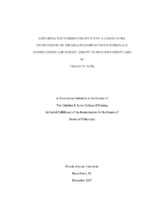Exploring the moderating effect of a caring work environment on the relationship between workplace mistreatment and nurses' ability to provide patient care
View File(s)
Visitor Statistics
Visits vs Downloads
Visitors - World Map
Top Visiting Countries
| Country | Visits |
|---|
Top Visiting Cities
| City | Visits |
|---|
Visits (last 6 months)
Downloads (last 6 months)
Popular Works for Moffa, Christine M. by View
| Title | Page Views |
|---|
Popular Works for Moffa, Christine M. by Download
| Title | Downloads |
|---|
View Citations
Citations
Workplace mistreatment (bullying, horizontal violence, and incivility) has been shown to impact nurses’ work satisfaction, job turnover, and physical and mental health. However, there are limited studies that examine its effect on patient outcomes. A correlational descriptive study of 79 acute care nurses was used to test a social justice model for examining the relationship between workplace mistreatment, quantified as threats to dimensions of nurses’ well-being (health, personal security, reasoning, respect, attachment, and self-determination), and nurses’ ability to provide quality patient care. In addition, this study considered the moderating effect of caring work environment among co-workers on nurses’ ability to provide quality patient care in the face of workplace mistreatment. Stories of workplace mistreatment were collected anonymously and analyzed for alignment with threats to six dimensions of well-being. Ability to provide
patient care was measured using the Healthcare Productivity Survey and a caring work environment was measured via the Culture of Companionate Love scale.
The results demonstrated that threats to all six dimensions of well-being described by Powers and Faden (2006) were expressed in nurses’ stories of workplace mistreatment. Furthermore, 87% reported a decrease in ability to provide patient care after an incident of workplace mistreatment. Yet frequency of threatened dimensions did not have a significant relationship with ability to provide patient care. Moreover, there was a significant moderator effect of the caring work environment on the relationship
between number of threatened dimensions of well-being and ability to provide quality patient care. Nurses in high caring environments loss less ability to provide care than nurses in low caring environments when one to three dimensions of well-being were threatened. However, this relationship reversed when four or more dimensions were threatened. Implications include further research on the relationship between workplace
mistreatment and nurse well-being and changing practice to include fostering a caring work environment in healthcare facilities.
The author still retains copyright.
This item has not gone through this repository's peer-review process, but has been accepted by the indicated university or college in partial fulfillment of the requirements for the specified degree.
| Type | Dissertation |
| Acquisition | Proxy-submission |
| Review Type | None: Degree-based Submission |
| Format | Text-based Document |
| Evidence Level | Other |
| Research Approach | Mixed/Multi Method Research |
| Keywords | Workplace Mistreatment; Well-being |
| CINAHL Subject(s) | Organizational Culture; Patient Care; Work Environment; Work Environment--Psychosocial Factors; Bullying; Disruptive Behavior; Incivility; Patient Safety; Quality of Health Care; Workplace Violence; Workplace Violence--Psychosocial Factors |
| Grantor | Florida Atlantic University |
| Advisor | Liehr, Patricia; Longo, Joy; Caudill, Steven |
| Level | PhD |
| Year | 2017 |
All rights reserved by the author(s) and/or publisher(s) listed in this item record unless relinquished in whole or part by a rights notation or a Creative Commons License present in this item record.
All permission requests should be directed accordingly and not to the Sigma Repository.
All submitting authors or publishers have affirmed that when using material in their work where they do not own copyright, they have obtained permission of the copyright holder prior to submission and the rights holder has been acknowledged as necessary.
Related items
Showing items related by title, author, creator and subjects.
-
A brief intervention to counter workplace incivility: Capturing biomarker data, psychological stress and effects on safe patient care
Willhaus, Janet; Clark, Cynthia M.; Kardong-Edgren, Suzan (2016-06-15)The American Nurses Association (2015) recently released a position statement clearly articulating the need for a multi-leveled approach to address workplace incivility, bullying, and violence. Recommendations include the ... -
Exploring workplace mistreatment and nurses' ability to provide quality patient care
Moffa, Christine M. (2017-10-20)We examined the relationship between workplace mistreatment (bullying etc.) and nurses' ability to provide quality care to patients. A social justice model was used as a lens to examine if detriments to nurse well-being ... -
Nursing incivility and the culture of safety in an acute care facility
Galosi, Gina M. (2018-05-09)Background: Nursing incivility is a problem for the profession of nursing and interferes with the establishment of a culture of safety, placing patient safety at risk. Elements associated with incivility, Jean Watson’s ... -
Factors associated with peer violence among elementary, middle and high school students
Perron, Tracy J.The purpose of this study was to examine the relationships among perceived school climate, self-reported psychosomatic symptoms, visits to the school nurse for reported psychosomatic symptoms and reports of bullying behaviors ... -
The relationships between work-family conflict, job satisfaction and psychological well-being among African American nurses
Gipson-Jones, Trina L.The specific aims of the proposed study, which were derived from Roy's Adaptation model (Roy & Andrews, 1999) are to (1) determine the levels of the dimensions of work-family conflict, job satisfaction and psychological ...





